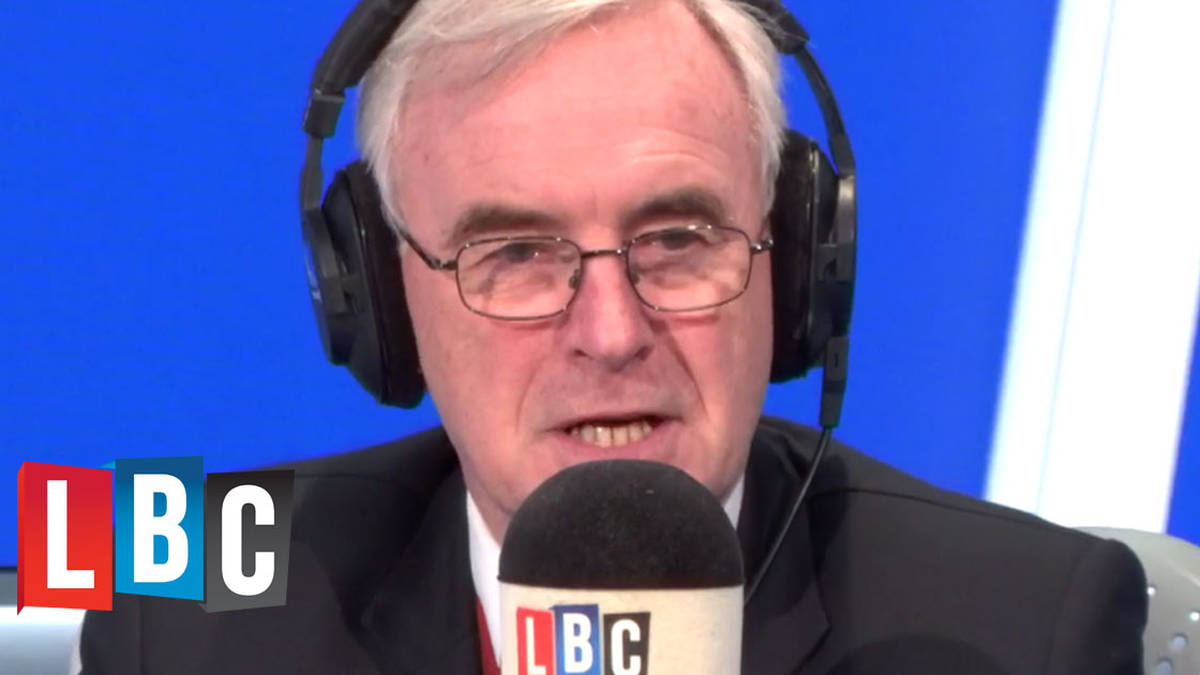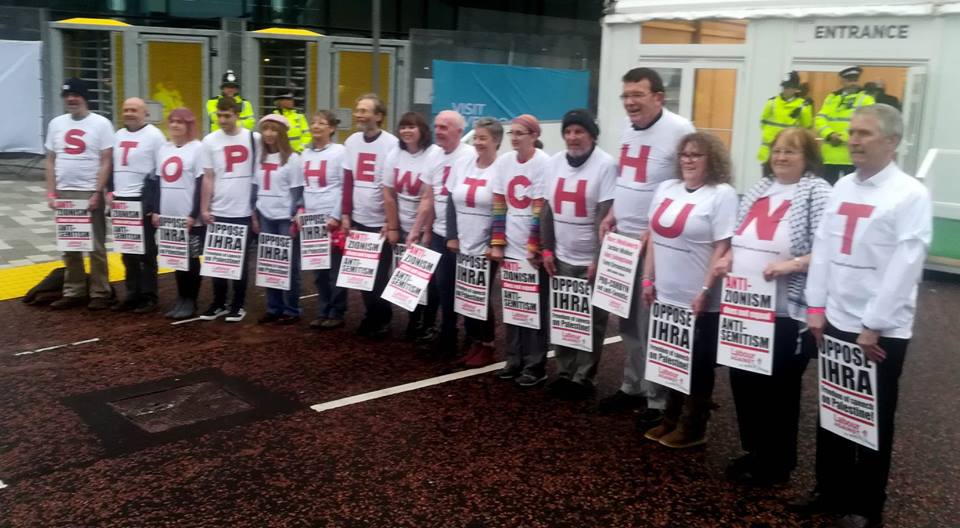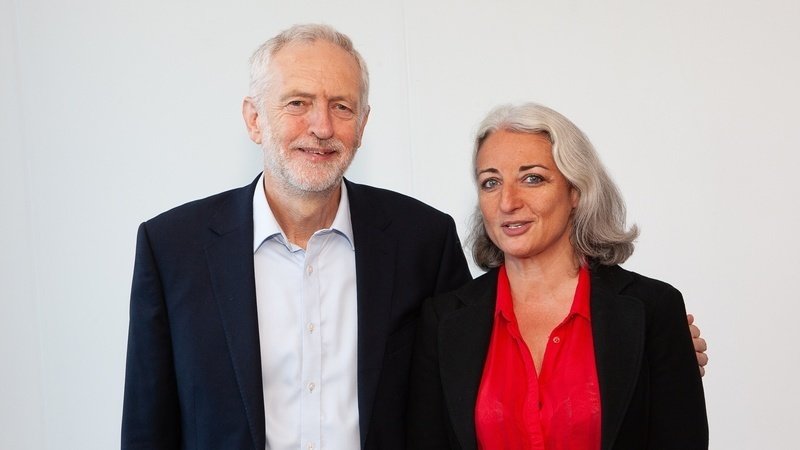David Shearer of Labour Party Marxists reports on another conference dominated by top table speakers and characterised by choked debates
On February 9 comrades gathered in London for he annual conference of the Labour Representation Committee – 127 attended, according to the organisers.
Unfortunately, however, the time allocated to actual debate was totally inadequate – there were far too many platform speakers, who were all given much more time than ordinary LRC members. This only served to reinforce the notion shared by many on the LRC left – what today is the purpose of this organisation and where is it going?
Matt Wrack, general secretary of the Fire Brigades Union, referred in his opening remarks from the chair to the “huge political crisis” we are facing over Brexit and said that the election of Jeremy Corbyn had meant that there is now a greater need for the left to organise. He then welcomed the main speaker – shadow chancellor John McDonnell, one of the LRC’s founders in 2004.
McDonnell referred to the original objectives of the LRC “when we set it up” – in other words, “how to achieve socialism in this country”. During the leadership of Tony Blair many were asking whether Labour was “still a vehicle” – its membership was at most 150,000 and the trade unions were “almost an embarrassment”. There was a “real feeling” about whether the Labour Party could be “retrieved”, according to McDonnell. But he then went on to say that it was always a question of how to “reconstruct” Labour – “leaving was never on the agenda” and it had to be “refounded from within”.
This was, of course, rather disingenuous. The name of the new organisation says it all – the original Labour Representation Committee was set up in 1900 with the specific aim of forming a new working class party, and establishing a Labour Party mark two was considered to be at the very least a strong possibility while Blair was firmly at the helm.
However, the “foundations” for retrieving the Labour Party had, according to McDonnell, been “laid by the LRC” since its creation 15 years ago. The discussions that took place then within the LRC will hopefully soon be “represented by [reflected in?] a Labour government” and “people here should be proud of that achievement”, he said.
McDonnell went on to talk about what the presumably “refounded” Labour Party would do if it was elected. It would “democratise our economy” and reinstate trade union and employment rights by “scrapping the anti-union laws introduced by the last Tory government”. (By contrast the main document presented by the LRC executive – a statement headed ‘Preparing our movement for the struggles ahead’ – declared that Labour should be “committed to scrapping the anti-union laws – not just the most recent ones, but Thatcher’s too”. Similarly a successful FBU motion demanded the repeal of “all anti-union laws introduced by Thatcher and Major, as well as Cameron”.)
McDonnell went on to talk about the unions’ role in the running of capitalism – in the newly “renationalised sectors” they would be represented on the board. Meanwhile, Labour would “introduce a fair taxation system to fund the public service we need” and “make sure we have a fair and decent society” – not to mention an “ethical foreign policy”: never again would British troops be involved in overseas occupations, heclaimed. But for him these proposals for a fairer capitalism could be summarised by the “possibility of a Labour government implementing a socialist programme”.
And, the more McDonnell, like others before him, abandons any notion of working class state power, the more he resorts to vague terms – his favourite being ‘solidarity’. For instance, we need to “base our movement on class solidarity”, he said, building upon those “relations of solidarity right across Europe” – apparently that was what Labour’s policy on Brexit was all about.
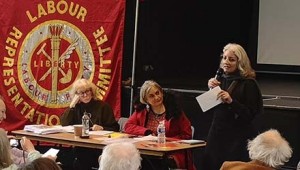 Interestingly, questions from the floor came from a number of comrades who had been targeted, or connected to those targeted, by the Labour bureaucracy in the ongoing ‘Anti-Zionism equals anti-Semitism’ witch-hunt (in relation to which McDonnell claimed the leadership had “implemented reforms”). The vice-chair of South Thanet Constituency Labour Party complained bitterly about the national executive “blocking our candidate”, Rebecca Gordon- Nesbitt. He urged the leadership to “do something urgently” – otherwise the “whole project will collapse”.
Interestingly, questions from the floor came from a number of comrades who had been targeted, or connected to those targeted, by the Labour bureaucracy in the ongoing ‘Anti-Zionism equals anti-Semitism’ witch-hunt (in relation to which McDonnell claimed the leadership had “implemented reforms”). The vice-chair of South Thanet Constituency Labour Party complained bitterly about the national executive “blocking our candidate”, Rebecca Gordon- Nesbitt. He urged the leadership to “do something urgently” – otherwise the “whole project will collapse”.
Also posing a question was Deborah Hobson, this time about Marc Wadsworth, who was expelled for daring to publicly criticise Ruth Smeeth MP (although he did not know she is Jewish, she accused him of anti-Semitism!). Comrade Hobson asked whether the Chakrabarti recommendations about due process for Labour’s disciplinary procedure would be implemented any time soon.
After some pointed heckling from the front rows, comrade Wrack agreed to call Jackie Walker to speak – she confirmed that her own disciplinary hearing over allegations of anti- Semitism would finally take place on March 26 (she has been suspended for well over two years). In the meantime, she said, people have been “calling me out as an anti-Semite” (which she vigorously denies, of course, being Jewish herself), and publicly insisting she should be expelled. Such people have been “saying outrageous things without censure”.
In response to these points, McDonnell stated vaguely that he wanted to “express my support” to the comrades of South Thanet and promised, in relation to the disciplinary process, to check with the NEC to “see how far they’ve got” in implementing Chakrabarti. As for comrade Walker, he would raise the question of abuse “with the general secretary and with Jeremy”, but he had great confidence in the “new system” that Jennie Formby was “putting in”. That was as far as his “solidarity” with these comrades went.
In fact it was the Tories he was referring to when he declared: “No matter what they throw at us, if we stand together in solidarity we can fight back.” He concluded that we will soon have “a socialist in No10” (and hopefully No11, he added). It just shows “how far we’ve come” – and “this organisation has made a major contribution”.
This exaggeration of the LRC’s role seemed to go down well with a number of comrades and unfortunately McDonnell’s statements received a warm response from some quarters.
Statement
Eventually we got down to the motions and amendments that had been tabled. Introducing the LRC executive’s ‘Preparing our movement for the struggles ahead’ was political secretary Mick Brooks, who stated that if Corbyn was elected the “capitalist establishment” would do all it could to “neuter” him. But there was no mention, either by him or in the statement, of actual measures that might be undertaken: for instance, the possibility of Corbyn being sidelined altogether and someone else being summoned by the queen to head a national government.
While the statement contained a basically correct assessment of the witch-hunt and the weaponisation of anti-Semitism, the same cannot be said for Labour’s For the many, not the few election manifesto. While this was “far from being a socialist programme”, read the statement, it nevertheless “represented a huge step forward” and “addressed many of the issues facing us”. On Brexit, while the LRC “supports the free movement of people” and is “opposed to immigration controls”, it also “stands four-square behind our leadership’s proven strategy in fighting against ‘no deal’ and for a general election”.
In his speech comrade Brooks called For the many an “eye-opener to millions”. He also noted that unnamed people, instead of “going on the offensive” against the witch-hunt, were apologising for unfounded allegations of anti-Semitism. While Jennie Formby was a “great improvement” over former general secretary Iain McNicol, we still “have to be critical” of the Labour establishment.
Because the McDonnell session had overrun by almost half an hour, the movers of amendments were now restricted to three minutes. First up was Tony Greenstein, introducing the attempt by Labour Against the Witchhunt to insert a little more precision and backbone into the section of the statement dealing with the rightwing assault against anti-Zionists and leftwingers within Labour. Comrade Greenstein – himself expelled basically for ‘being rude’ online, thus “bringing the party into disrepute” (he had originally been accused of anti-Semitism, of course) – stressed that it was a big mistake not to “stand up against the weaponisation of anti-Semitism”. He thought that the LRC executive statement on this was “totally inadequate”, even though he agreed with Labour Briefing editor Graham Bash’s passionate speech about the “fake allegations used to divide the left”.
But the amendment was opposed by the LRC leadership. Jon Rogers, a prominent Unison activist said he was “uncomfortable” about LAW’s reference to “low-level anti- Semitism” within Labour, interpreting this as somehow playing down our opposition to anti-Semitism when it actually occurs. Where LAW advocates education and the role of joint struggle, perhaps comrade Rogers is an advocate of ‘zero tolerance’ and therefore rules that allow the expulsion of members for what amounts to trivial reasons.
However, the LRC executive did support a separate LAW motion which totally opposed the International Holocaust Remembrance Alliance ‘definition’ of anti-Semitism. Moving the motion, Tina Werkmann pointed out that the IHRA definition was “an attempt to redefine anti-Semitism”, so that it now means “criticism of Israel”. Now that it has been adopted by Labour’s NEC, it is “a question of time” before it is used to discipline comrades making legitimate criticism of the Israeli state, she said. For his part, another LAW comrade, Stan Keable,warnedthatitmightevenfind reflection in legislation – that is why we must “reject” the IHRA “in its entirety”.
This was largely in tune with the views of those present, including most of the executive, and the motion was overwhelmingly carried, although the LAW amendment was defeated on a show of hands.
Debate
The afternoon session began with comrade Wrack vacating the chair in favour of Deborah Hobson. Before that, the FBU general secretary reminded conference that his union had been the only one to support the principle of open selection for parliamentary candidates at the 2018 Labour conference (as a result of union block votes that principle – overwhelmingly favoured by CLP delegates – was defeated). He thought that the mobilisation of “a huge mass movement” would be required in support of a Corbyn government – but, while this was “an opportunity of a lifetime”, we “must be better organised”.
The conference then went on to ‘discuss’ several other motions – I use the word ‘discuss’ advisedly, because the number of speakers was severely curtailed to one in favour and one against – after which the mover was granted a few seconds to reply!
This was more than a pity, because there was a lot to debate. For example, there was a controversial motion on transgender rights – a topic that arouses passion both from those who believe that any individual must be able to declare their own gender and those who state that it should not be a matter of self-identification. The pro-trans motion was carried – with, of course, very little light shed on the differences.
Then there was the motion from Labour Party Marxists. This called for a “socialist clause four” – in other words, the replacement of the 1995 Blairite statement of aims not by the original 1918 version, but one that proposed actual, genuine socialism.
Moving the motion, John Bridge stated that while it had been right to defend the old clause four against the Blairites, now that Corbyn is Labour leader it is wrong to defend the Fabianism of Sidney Webb. We can be far bolder. The old clause four did not envisage abolishing wage labour, nor did it envisage a classless society. The old clause four was, in fact, nationalist and managerial. Rather than idealising “capitalism without capitalists”, Labour needs a “radical, anti-capitalistclause four”.
However, some comrades wanted the pre-Blair version reinstated, while, for his part, Pete Firmin, a leading member of the LRC, seemed to imply that the whole debate was a waste of time – rather we need a commitment on actual policies, he contended.
In the 10 seconds comrade Bridge was granted to reply to this Bernsteinism (the movement is everything, the aim is nothing), he pointed out that, rather obviously, we need both a full range of policies and a clear statement of objectives and final aims. Though it won a third of the votes, the motion was defeated.
The reason why discussion on all these motions was so severely restricted was that, apart from the time accorded to platform speakers, the executive wanted the conference to fully consider its own proposal for the unity of the left within the party. It was noticeable that the executive’s ‘Appeal to the Labour left’ (rather like John McDonnell) did not set out the specific aim of defeating and finally ridding the party of the pro- capitalist right. Rather it was a case of creating a “movement supportive of, but independent of, the leadership”. The left needs to be “a vibrant, organised and strategic partner to that leadership”.
In this session Rebecca Gordon- Nesbitt herself spoke from the floor. She talked of how fake accusations of anti-Semitism, are being used to “get rid of a democratically selected candidate”. She was in favour of a specifically “socialist Parliamentary Labour Party”.
It was clear that Momentum now enjoys very little support amongst LRC partisans – its total lack of democracy has ensured that most militants have written it off as a vehicle for Labour’s socialist left, while Jon Lansman’s actual support for false accusations of anti-Semitism has left him discredited and widely despised. Replying to the debate, Ben Sellers, of Red Labour, stated that it was not a question of “setting up a rival group”, but rather of creating an organisation that, unlike Momentum, could actually unite the Labour left effectively.
However, for what purpose such unity was required (apart from giving support to the leadership) was not outlined. As I have pointed out, nowhere does the LRC declare that the pro-capitalist right has no place within the party, nor does it wish to specify exactly what it means by socialism and the type of organisation needed to fight for it.
So what is the purpose of the LRC? Despite McDonnell’s denials, it was originally formed at the very least to consider the possibility of creating a replacement Labour Party. But, now that this has been completely abandoned, surely those who say they are Marxists need to organise themselves as Marxists. Or, like McDonnell, have they now been won over completely to placing hopes in a nicer, fairer capitalism?
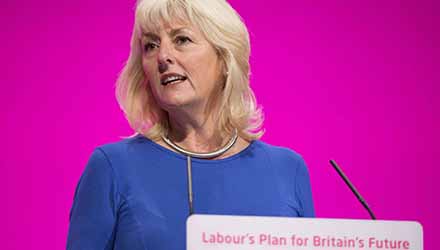
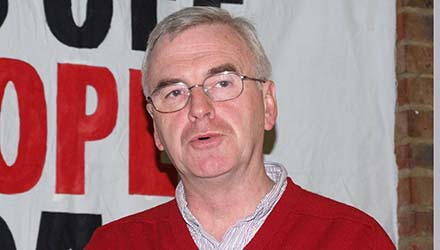
 Interestingly, questions from the floor came from a number of comrades who had been targeted, or connected to those targeted, by the Labour bureaucracy in the ongoing ‘Anti-Zionism equals anti-Semitism’ witch-hunt (in relation to which McDonnell claimed the leadership had “implemented reforms”). The vice-chair of South Thanet Constituency Labour Party complained bitterly about the national executive “blocking our candidate”, Rebecca Gordon- Nesbitt. He urged the leadership to “do something urgently” – otherwise the “whole project will collapse”.
Interestingly, questions from the floor came from a number of comrades who had been targeted, or connected to those targeted, by the Labour bureaucracy in the ongoing ‘Anti-Zionism equals anti-Semitism’ witch-hunt (in relation to which McDonnell claimed the leadership had “implemented reforms”). The vice-chair of South Thanet Constituency Labour Party complained bitterly about the national executive “blocking our candidate”, Rebecca Gordon- Nesbitt. He urged the leadership to “do something urgently” – otherwise the “whole project will collapse”.
